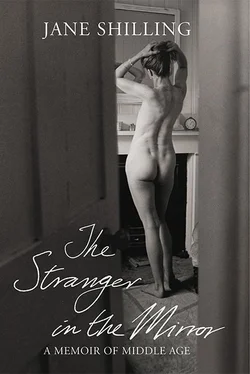Ah. And here I was, a generation later, enacting the same drama with my own child. Who was presumably judging me from twenty yards behind on the glaring Cretan pavement with identical loathing and contempt. This must be the moment, the subject of much wry hilarity among the Grumpy Old Women, when you realise in middle age that you have turned into your parents. Only it didn’t feel hilarious to me. It felt as though our family life was a fragile construction that I’d been building since he was born – an intricate nest that I’d woven around the pair of us. And now I’d smashed it and however I tried to repair it, it would never be quite the same again. This moment would never not have happened.
Now that the exultation of rage had left me, I thought what a very middle-aged sort of tantrum it had been. If I’d been younger or older there would have been no discussion about where we should eat. In my twenties I would have swept us into the market cafe as soon as the idea had formed in my mind, never mind whether anyone else fancied the look of the squid. And if I’d been older, I might have mastered my unruly ego sufficiently to know that the peace of the day mattered more than the authenticity of the lunch. Either approach would have dispensed with the ugly scene, the blighting of the adventure over a plateful of food. But I was neither one thing nor the other and the gap between what I had been and what I might become was filled with fury and remorse.
We ate pizza in the tourist restaurant, conversing carefully like polite strangers, then spent the afternoon shopping for presents. In the early evening we returned to the harbour. The light was slanting now; the cafe tables at the water’s edge filling up, the glamour of the evening beginning. It felt like the wrong moment to be going home. Along the harbour wall were ranged old-fashioned horse-drawn carriages with leathery black hoods like enormous prams, offering scenic rides through the town.
‘We could take a carriage ride,’ said Alexander. ‘Go on. Let’s. It would be fun.’
‘But it’s for tourists,’ I said, for the second time that day.
‘But we are tourists,’ he said, also for the second time.
The horses stood patiently, their heavy harness decorated with a frou-frou of bright tassels and trinkets. Some wore straw hats with holes punched for the ears, roguishly wreathed with flowers. I wasn’t sure what I felt about the use of equines in these circumstances; performed a hurried mental trade-off – animal welfare versus regaining of ground lost at lunchtime, with a brief side reflection on what an idiot I’d look, perched up there in a carriage trolling through the town like a carnival queen – before saying All right. Why not? As long as the horses are sound.
We walked up and down the carriage lines like show judges, then picked one drawn by a flea-bitten grey with pink tassels. The driver, presumably used to middle-aged Englishwomen, waited patiently while I looked at his horse’s legs. Alexander gazed into the distance, willing himself elsewhere. At last we got into the carriage and lurched off across the cobbles. I felt preposterous; conspicuous as the Queen in the state landau. I was going to make a joke about it. But then I looked sideways at my son sitting next to me on the old cracked leather seat, enjoying the trot through the crowded street in the busy warm evening, cars in front, cars behind, people on either side, with superb simplicity, not outside himself looking in, not analysing the moment, not taking a perspective, other than that of being in this carriage with me on a warm evening in an old foreign town. And for once I thought I wouldn’t say anything, after all.
In both the places where we had lived our neighbours on either side were bemused by our lack of family. In the Peckham flat and the cottage in Greenwich we were objects of intense sympathetic curiosity. Both sets of neighbours came from a clannish white working-class background, in which bonds of close family were both an obligation and the boundary by which their personal universe was defined. It was the background from which my own grandparents came. I recognised its intonations; was familiar with some of its vocabulary and customs, but like a visitor, not a native. In a couple of generations, my family had perfected a fluent impersonation of the cooler mores of the middle classes.
I met my first neighbour, Judy, over the garden wall. We lived in a curving, uphill south London terrace of raw-boned, yellow-brick Edwardian houses with cream stuccoed façades and long, narrow gardens at the back. Judy was a diligent gardener: tall, thin, a nervous chain-smoker with a reserve of tender energy that brought dahlias, gladioli, standard roses and busy Lizzie springing from the cold London clay.
She and her husband, Michael, who worked punishing hours as chauffeur to the chief executive of a department store, had bought the house when they were first married and lived there with their children, Richard, a taciturn teenager, and Michelle, a pretty schoolgirl on the turn of adolescence. I had bought the basement flat next door: two dark, low-ceilinged rooms with Pooterish vestiges of nineteenth-century character and a strip of rear garden.
Judy’s side of the old brick wall that separated us had the fine, kempt look of a garden that has been planned, groomed and tended for years. The grass was smooth, the flowerbeds a riot of perfectly deadheaded seasonal colour. Even the bindweed shrank from the approach of Judy’s vigilant hoe. On my side there was evidence of a plot that had once been loved but had fallen into neglect: a great lilac bush outside the kitchen door, a strip of coarse, uneven turf punctuated with thorny old roses.
One fine spring evening just after I had moved in I was on my hands and knees, planting sweet peas. Judy, out watering her French marigolds, looked over the wall, saw me crouching there and we fell at once into an affectionate gardeners’ intimacy. She had a frank curiosity about my circumstances, and an openness about her own that seemed perfectly extraordinary to me. I had been raised on a strict code of discretion and secrecy. Don’t ask other people’s business. Don’t tell your own.
In the fine summer weather we met most evenings with our hoes and watering cans, and very soon I knew what struck me as an almost reckless amount about her life. Even if I had been able to overcome my long-ingrained habits of emotional parsimony, I had a pitiful quantity of information to offer in return: one love affair, not going well; regular job; relations with family distant. In four years as Judy’s next-door neighbour, the most exciting thing I did was acquire a couple of cats (they, too, were instantly absorbed into the extended family, their eccentricities cherished and indulged).
At last I contrived to produce a real coup de théâtre with the news that I was pregnant. And not just pregnant but unmarried and dumped by the father: a proper Victorian melodrama in the making. While almost everyone in my circle (including me) greeted the news as though it was at best a mishap, at worst a tragedy, Judy seemed as elated as though the baby were a welcome arrival. She hugged me, rubbed my 20-week bump and went straight out to buy needles and wool.
Over the garden wall came a stream of intricate, lacy cardigans, mittens, hats and pram blankets, while in the road at the front of the house my battered old car, which hadn’t been washed in all the time I’d owned it, began unaccountably to shine. Waking early one Sunday morning I found Michael and Richard giving it the same painstaking waxing that they administered to the chief executive’s great gleaming pristine Volvo.
When we moved to Greenwich two years later, it was into the force field of another family with an exceptionally strong gravitational pull. Violet was 81 when we arrived, but looked 60. She, too, had a front garden full of vivid flowers, but they were made of plastic, renewed twice yearly. Not for her dreamy evening chats while deadheading the roses and swapping advice about aphid control. Her evenings were spent at the Bingo, to which she set off around teatime, dressed in vivid costumes of peach, turquoise or cyclamen with co-ordinated shoes and bag, heavily bejewelled earlobes clinking and knuckles clotted with gold rings, her lipstick matching her manicured nails (‘filbert nails’, she said, stretching them out for me to admire).
Читать дальше












